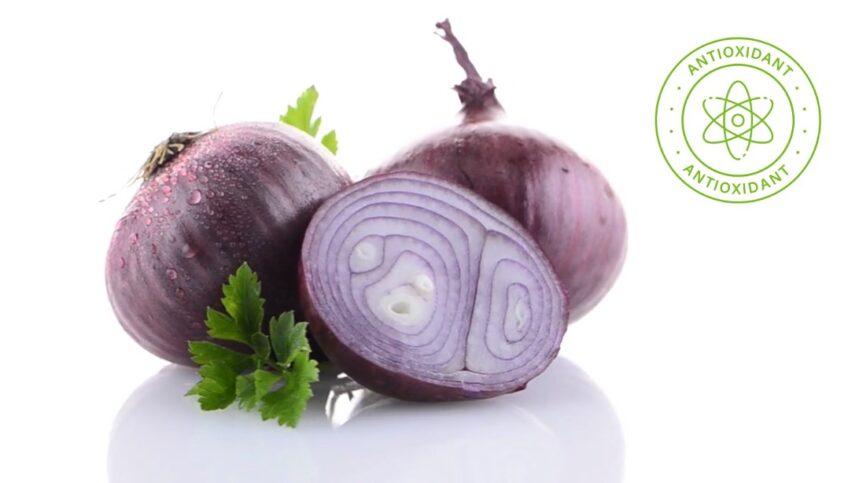Onion is a versatile vegetable used in countless dishes worldwide to enhance flavor. Consuming raw onion daily offers numerous health benefits. Vitamin C and other nutrients found in onions help prevent cancer and improve skin and hair health. Onion extracts also regulate blood sugar levels, boost immunity, increase sex drive, and aid in anemia control.
Nutritional Value of Onion Onions have a multitude of medicinal properties due to their rich content of nutrients, vitamins, minerals, and organic compounds. Key components include sulfuric compounds and quercetin, both vital for maintaining good health.
Onions also contain mineral components such as calcium, magnesium, sodium, potassium, selenium, and phosphorus. They are an excellent source of vitamin C, vitamin B6, and dietary fiber.
Page Contents
- 1 Nutritional facts Per 100 Grams
- 2 Vitamins and Minerals
- 3 Benefits
- 4 Side Effects
- 5 FAQ
- 5.1 What are some other ways to consume onions?
- 5.2 Can onions help with weight loss?
- 5.3 Can onions cause bad breath?
- 5.4 Are there any drug interactions with onions?
- 5.5 Can consuming onions increase the risk of developing kidney stones?
- 5.6 Can onions be harmful to dogs?
- 5.7 Can onions help with hair growth?
- 5.8 Are there any risks to consuming too many onions?
- 6 Conclusion
Nutritional facts Per 100 Grams

| Nutrient | Amount (per 100g) |
|---|---|
| Calories | 40 kcal |
| Total Fat | 0.1 g |
| Saturated Fat | 0.042 g |
| Polyunsaturated Fat | 0.017 g |
| Monounsaturated Fat | 0.013 g |
| Cholesterol | 0 mg |
| Sodium | 4 mg |
| Total Carbohydrate | 9.34 g |
| Dietary Fiber | 1.7 g |
| Sugar | 4.24 g |
| Protein | 1.1 g |
Vitamins and Minerals
| Vitamin/Mineral | Amount (per 100g) |
|---|---|
| Vitamin C | 7.4 mg |
| Vitamin B6 | 0.12 mg |
| Folate | 19 µg |
| Vitamin A | 2 IU |
| Vitamin E | 0.02 mg |
| Vitamin K | 0.4 µg |
| Calcium | 23 mg |
| Iron | 0.21 mg |
| Magnesium | 10 mg |
| Phosphorus | 29 mg |
| Potassium | 146 mg |
| Sodium | 4 mg |
| Zinc | 0.17 mg |
| Copper | 0.039 mg |
| Manganese | 0.129 mg |
| Selenium | 0.5 µg |
Onions are packed with nutrients, offering a wealth of vitamins and minerals while being low in calories.
A medium-sized onion contains only 44 calories but provides an impressive amount of vitamins, minerals, and fiber. This vegetable is especially rich in vitamin C, which plays a crucial role in immune health, collagen production, tissue repair, and iron absorption.
Vitamin C also acts as a potent antioxidant in the body, safeguarding cells from damage caused by unstable molecules known as free radicals.
Additionally, onions are abundant in B vitamins, such as folate and vitamin B6, which are essential for metabolism, red blood cell production, and nerve function.
Finally, onions are a good source of potassium, a mineral that many people don’t consume enough of. Proper cellular function, fluid balance, nerve transmission, kidney function, and muscle contraction all depend on adequate potassium intake.
Benefits
Supports heart health
Onions are rich in antioxidants and compounds that combat inflammation, lower triglycerides, and decrease cholesterol levels, all of which contribute to a reduced risk of heart disease.
Their strong anti-inflammatory effects can also help lower high blood pressure and guard against blood clots.
Quercetin, a flavonoid antioxidant found in high concentrations in onions, has powerful anti-inflammatory properties that can help lower risk factors for heart disease, such as high blood pressure.
In a study of 70 overweight individuals with high blood pressure, a daily dose of 162 mg of quercetin-rich onion extract significantly lowered systolic blood pressure by 3-6 mmHg compared to a placebo.
Onions have also been proven to reduce cholesterol levels. In a 2014 study involving 54 women with polycystic ovarian syndrome (PCOS), consuming large quantities of raw red onions (80-120 grams per day) for eight weeks led to a decrease in total and LDL (bad) cholesterol compared to a control group.
Furthermore, animal studies suggest that onion consumption may lower risk factors for heart disease, including inflammation, high triglyceride levels, and blood clot formation.
Abundant in antioxidants

Antioxidants are compounds that prevent oxidation, a process that can cause cellular damage and contribute to diseases such as cancer, diabetes, and heart disease. Onions are an exceptional source of antioxidants. They contain at least 17 different types of flavonoid antioxidants.
Red onions, in particular, are rich in anthocyanins, which are plant pigments belonging to the flavonoid family that gives red onions their vibrant color. Numerous population studies have shown that individuals who consume more anthocyanin-rich foods have a lower risk of heart disease.
For instance, a study involving 43,880 men found that those who consumed up to 613 mg of anthocyanins per day had a 14% lower risk of nonfatal heart attacks.
Similarly, a 2018 review concluded that a higher intake of anthocyanin-rich foods was associated with a decreased risk of heart disease and heart disease-related deaths. Moreover, anthocyanins have been found to protect against certain types of cancer and diabetes.
Packed with anti-cancer compounds
Consuming vegetables from the Allium genus, such as garlic and onions, has been associated with a reduced risk of certain types of cancer, including stomach and colorectal cancer.
A review of 26 studies revealed that individuals who consumed the highest amount of allium vegetables had a 22% lower risk of being diagnosed with stomach cancer compared to those with the lowest intake.
Furthermore, a 2014 review of 16 studies involving 13,333 people showed that those with the highest onion consumption had a 15% reduced risk of colorectal cancer compared to those with the lowest intake.
These cancer-fighting properties are attributed to the sulfur compounds and flavonoid antioxidants found in allium vegetables.
For instance, onions contain onionin A, a sulfur-containing compound that has been shown to reduce tumor development and slow the spread of ovarian and lung cancer in test-tube studies.
Onions also provide fisetin and quercetin, which are flavonoid antioxidants that may impede tumor growth.
Aids in blood sugar management

Consuming onions can help regulate blood sugar levels, which is particularly important for individuals with diabetes or prediabetes.
An earlier study involving 42 people with type 2 diabetes showed that consuming 3.5 ounces (100 grams) of raw red onion significantly reduced fasting blood sugar levels within 4 hours.
Moreover, several animal studies have indicated that onion consumption may be beneficial for blood sugar management.
A study found that diabetic rats fed a diet containing 5% dried onion powder for 8 weeks experienced reduced fasting blood sugar levels and had lower triglyceride and cholesterol levels compared to a control group.
Specific compounds in onions, such as quercetin and sulfur compounds, also exhibit antidiabetic effects.
For instance, quercetin has been shown to interact with cells in the small intestine, pancreas, skeletal muscle, adipose tissue, and liver to regulate whole-body blood sugar levels.
Supports bone health
While dairy often receives credit for promoting bone health, many other foods, including onions, can also contribute to strong bones.
A study involving 24 middle-aged and postmenopausal women showed that those who consumed 3.4 oz (100 milliliters) of onion juice daily for 8 weeks experienced improved bone mineral density and antioxidant activity compared to a control group.
Another older study with 507 perimenopausal and postmenopausal women found that those who ate onions at least once a day had a 5% higher overall bone density than individuals who consumed them once a month or less.
Moreover, the study demonstrated that older individuals who ate onions most frequently reduced their risk of hip fracture by over 20% compared to those who never ate them.
It’s believed that onions help decrease oxidative stress, increase antioxidant levels, and reduce bone loss, which may prevent osteoporosis and enhance bone density.
Exhibits antibacterial properties

Onions possess the ability to combat potentially harmful bacteria, such as Escherichia coli (E. coli), Pseudomonas aeruginosa, Staphylococcus aureus (S. aureus), and Bacillus cereus.
Additionally, onion extract has demonstrated inhibitory effects on the growth of Vibrio cholerae, a bacterium that poses a significant public health concern in certain regions worldwide. Quercetin, extracted from onions, appears to be especially effective in reducing bacterial growth.
Some test-tube studies suggest that quercetin could inhibit the growth of various bacterial strains, including Helicobacter pylori (H. pylori), a type of bacterium linked to stomach ulcers and specific digestive cancers.
Another test-tube study discovered that quercetin damaged the cell walls and membranes of E. coli and S. aureus.
Boosts Digestive Health
Onions are a great source of fiber and prebiotics, which are essential for optimal gut health. Prebiotics are types of fiber that beneficial gut bacteria break down, producing short-chain fatty acids that strengthen gut health, boost immunity, reduce inflammation, and enhance digestion.
Onions contain prebiotics such as inulin and fructooligosaccharides that increase the number of friendly bacteria in the gut, improve immune function, and increase the absorption of important minerals such as calcium, which improves bone health.
Versatile and Easy to Add to Your Diet

Onions are a versatile and easy way to add flavor and nutrition to your meals. They can be enjoyed raw or cooked, and provide a range of health benefits.
Here are some simple ways to add onions to your diet:
- Add raw onions to guacamole or salsa for a flavorful kick.
- Incorporate caramelized onions into savory baked goods.
- Combine cooked onions with other vegetables for a healthy side dish.
- Add cooked onions to egg dishes like omelets, frittatas, or quiches.
- Top meat, chicken, or tofu with sautéed onions.
- Mix thinly sliced red onions into salads for a crunchy texture.
- Create a fiber-rich salad with chickpeas, chopped onions, and red peppers.
- Use onion and garlic as a base for stocks and soups.
- Add onions to stir-fry dishes for extra flavor.
- Top Mexican dishes like tacos and fajitas with chopped raw onions.
- Prepare a hearty onion and vegetable soup.
- Add onions to chili recipes for a flavor boost.
- Blend raw onions with fresh herbs, vinegar, and olive oil for a tasty homemade salad dressing.
Adding onions to your meals is an easy and delicious way to boost your nutrient intake and improve your overall health.
Side Effects

May aggravate IBS symptoms
On the other hand, onions may have some potential downsides for certain individuals, especially those with irritable bowel syndrome (IBS).
IBS is a condition that affects a significant portion of the population and is characterized by symptoms such as bloating, abdominal pain, cramping, and abnormal bowel movements. While food is not considered the cause of IBS, certain foods can trigger its symptoms.
Onions, garlic, and other allium vegetables contain fermentable oligo-, di-, monosaccharides, and polyols (FODMAPs), which are indigestible and slowly absorbed short-chain carbohydrates that can cause discomfort in people with IBS. Therefore, a low FODMAP diet that minimizes these foods has become a popular evidence-based treatment for IBS.
For those with IBS, onions may worsen or trigger symptoms and may need to be temporarily or permanently avoided.
Some people may be allergic
Some individuals may have an allergic reaction to onions. Food allergies occur when the immune system reacts negatively to proteins in certain foods, potentially affecting different organs and systems in the body, such as the skin, gut, heart, respiratory system, and nervous system.
Although cow’s milk, eggs, peanuts, fish, shellfish, tree nuts, soybeans, and wheat are common food allergens, fruits and vegetables can also trigger allergic reactions in adults. Onions belong to the Liliaceae family of flowering plants, along with garlic, leeks, and asparagus.
Studies have suggested that allergic cross-reactivity may occur between different Liliaceae plants and grass pollens, which means that individuals who are allergic to one of these plants may also have an allergic reaction to others.
Onions contain compounds such as diallyl disulfide and lipid transfer protein, which can cause allergy symptoms such as asthma, nasal congestion, runny nose, red eyes, itchy eyes and nose, and contact dermatitis, a type of rash that is red and itchy. Contact dermatitis may occur even if someone handles onions without consuming them, although this is rare.
May irritate the eyes
When you chop onions, you may experience a stinging sensation in your eyes that leads to tearing up. This happens because onions produce a sulfur metabolite called lachrymatory factor (LF), which acts as a chemical defense mechanism against animals and microbes.
LF is a volatile compound that easily evaporates and is released when onion tissue is disrupted. This irritant can reach your eyes, causing the tear-inducing effect of onions.
To avoid this, you can chill the onion, chop it under running water, wear sealed goggles, or light a match.
May cause heartburn
Onions may cause heartburn, which is a symptom of gastroesophageal reflux disease (GERD). This condition occurs when the contents of your stomach move back up into your esophagus, causing a burning sensation in your chest.
The muscle at the end of your esophagus called the lower esophageal sphincter (LES), relaxes, allowing food and gastric acid to pass into your esophagus. According to research from 2000, some foods, including onions, may trigger heartburn symptoms by promoting LES relaxation.
A 1990 study also found that a meal containing onions significantly increased heartburn episodes in people with frequent heartburn compared to the same meal without onions and a control group of people with no heartburn.
If you have heartburn, it may be best to avoid onions.
Other potential downsides of eating onions
There are a few other potential downsides to consuming onions, according to research. One common side effect of eating onions is bad breath, also known as halitosis, which may be temporary.
Consuming other foods such as garlic may also cause this. To combat this, brushing your teeth, flossing, chewing gum, or using mouthwash after eating may help.
Additionally, onions have a potential anticoagulant effect, which means they may prevent the formation of blood clots. While this may sound beneficial, it can be problematic if you’re taking certain medications.
Studies suggest that onions may interfere with anticoagulant drugs such as warfarin and slightly increase the risk of bleeding. However, the studies do not mention the quantities needed to pose a health risk, so more research is needed.
FAQ

What are some other ways to consume onions?
Other ways to consume onions include adding them to soups, stews, curries, and casseroles. You can also grill, roast, or sauté onions and serve them as a side dish.
Can onions help with weight loss?
Onions are low in calories and high in fiber, which may help with weight loss by promoting feelings of fullness and reducing overall calorie intake.
Can onions cause bad breath?
Yes, consuming onions can cause bad breath. To combat this, brushing your teeth, flossing, chewing gum, or using mouthwash after eating may help.
Are there any drug interactions with onions?
Onions may interfere with anticoagulant drugs such as warfarin and slightly increase the risk of bleeding.
Can consuming onions increase the risk of developing kidney stones?
No, onions do not increase the risk of developing kidney stones.
Can onions be harmful to dogs?
Yes, onions can be harmful to dogs and other pets as they contain compounds that can damage their red blood cells and lead to anemia. It is best to avoid feeding onions to pets.
Can onions help with hair growth?
Onions contain sulfur, which is essential for hair growth and health. Applying onion juice to the scalp may help improve hair growth and reduce hair loss.
Are there any risks to consuming too many onions?
Consuming too many onions can cause stomach discomfort, bloating, and flatulence in some individuals. It is also important to note that individuals with IBS may need to limit their onion intake to avoid triggering symptoms.
Conclusion
In conclusion, onions are a versatile and nutritious vegetable that offers numerous health benefits. Onions are rich in antioxidants, anti-inflammatory compounds, vitamins, and minerals that help combat various diseases, including heart disease, cancer, and diabetes.
Onions also aid in bone health, digestion, and exhibit antibacterial properties. Onions are easy to add to your diet and can be enjoyed raw or cooked, providing a range of health benefits.
However, onions may have some potential downsides for certain individuals, especially those with IBS. Onions can worsen or trigger IBS symptoms and may need to be avoided.
Some individuals may also be allergic to onions, and onions may cause heartburn in some people. Additionally, onions may interfere with anticoagulant drugs such as warfarin and slightly increase the risk of bleeding.
Theodore is a prolific author at Fischer Institute, known for his insightful articles on health and nutrition. His expertise spans a wide range of topics, from the benefits of traditional foods to the latest in health trends, always aiming to educate and empower readers towards better wellbeing.
Also Read:
- 8 Major Side Effects Of Eating Too Much Spinach: The…
- Major Side Effects of Eating Too Many Mung Bean…
- Side Effects of Testosterone Boosters - What They…
- Beware of the Risks: Major Side Effects of Acai…
- Major Eggplant Side Effects - Take Care of Your Health
- Overload: Major Side Effects of Eating Too Many…















